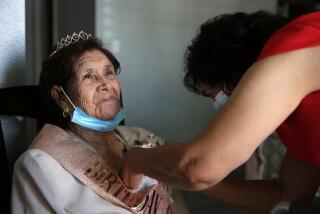Natalia Revuelta Clews dies at 89; socialite who had daughter with Fidel Castro
Natalia Revuelta Clews, the Cuban socialite who emptied her bank account and sold her diamond jewelry to support Fidel Castro when he was a little-known insurgent, has died. She was 89.
Revuelta, who first caught the eye of the young revolutionary in 1952, opened her home for Castro to plot a barracks assault the following year that is considered the start of the revolution. They later had an affair that produced a daughter, Alina, who as an adult became a harsh critic of the communist leader from exile in Florida.
Revuelta’s caretaker, Carmen Garcia, told the Associated Press that Revuelta died Friday in Havana and had been cremated in a private family ceremony. Revuelta’s longtime friend Natalia Bolivar, a renowned anthropologist, said Revuelta had been ill after a fall. Revuelta’s family could not be reached for comment.
Revuelta was “one of the most exquisitely beautiful women in Cuba and a woman with an abnormally sensuous appetite for revolution and adventure,” Georgie Anne Geyer wrote in her biography of Castro, “Guerrilla Prince.”
Born Dec. 6, 1925, “Naty” Revuelta was an only child whose parents divorced when she was a toddler. Her mother remarried when she was 10, to an executive at the U.S.-owned Havana Electric Company.
She attended the American-run Ruston Academy in Havana and Mt. St. Joseph’s Academy, a Catholic girls’ school in Chestnut Hill, Pa. She also studied business at Marjorie Webster College in Washington, D.C., before returning to Cuba at 19, working first for the U.S. Embassy and later for Standard Oil.
Revuelta was 22 when she married heart surgeon Orlando Fernandez, nearly 20 years her senior. She gave birth to a daughter, Nina, and became a fixture of Havana’s social scene. She belonged to the Havana Country Club, played in weekly bridge and tennis tournaments and often lunched at a yacht club.
“Blonde, green-eyed, buxom and always in exuberant spirits, Naty was the kind of woman who stopped eyes and tongues when she entered a room,” Geyer wrote in “Guerrilla Prince.”
But Revuelta was restless. Her husband worked long hours and she was tired of floating from one cocktail party to another, according to Wendy Gimble’s 1998 biography, “Havana Dreams.” She was also unfulfilled by motherhood.
Revuelta began attending meetings of the Orthodox Party, which opposed corruption in the government.
At the time, Castro was married to Mirta Diaz-Balart, whom he met while studying law at the University of Havana. He first saw Revuelta at a protest marking the anniversary of the 1871 slaying of independence-minded medical students by Spanish soldiers.
Castro dispatched a mutual friend who introduced the pair. A few days later, the same friend approached Revuelta, wanting to know if Castro could drop by her house. “Of course,” she replied. “After five o’clock, I’m always home.”
Castro was briefly jailed soon after for leading an underground movement against strongman Fulgencio Batista, and he didn’t turn up at Revuelta’s for months. But after he did, her home became a key planning area for the attack on the Moncada army barracks in eastern Cuba.
Revuelta was “one of an extraordinary contingent of beautiful and/or highly intelligent women who, in effect, dedicated their lives to [Castro] and his cause,” Tad Szulc wrote in “Fidel: A Critical Portrait.”
She handed over all of her savings of 6,000 pesos — then worth the same amount in dollars — to support his movement, and later pawned her sapphires, emeralds and diamond jewelry for his cause. She sewed fatigues for his rebels to wear, and delivered Castro’s uprising manifesto to top Havana newspaper editors.
The 1953 barracks assault failed, with most of the rebels killed and the rest captured. Revuelta wrote to Castro frequently when he was in prison, sending him books and an envelope of sand to remind him of the beach.
Castro’s prison love letters to Revuelta are one of the few glimpses into his closely guarded emotional side: “I am on fire. Write to me, for I cannot be without your letters,” he wrote in 1954.
Castro and Diaz-Balart divorced, in part because one of his letters to Revuelta was mistakenly delivered to his wife.
Castro was freed in 1955, and he and Revuelta became lovers for what she said was the first time. She became pregnant, though she didn’t tell Castro until after he had fled to Mexico later that year.
Castro then asked Revuelta to come to Mexico and marry him, but she refused, convinced he would not survive. Alina was born in March 1956, six months before Castro returned to Cuba and took to the Sierra Maestra mountains.
Castro did not recognize his daughter as his own, and Revuelta’s estranged husband gave her his last name. Castro eventually told Alina at 12 that she could become a Castro, but by then she didn’t want to, according to her memoir.
After Castro’s forces toppled Batista, Revuelta quietly began preparing for a role as Cuba’s first lady — but it was not meant to be, as Castro kept his distance.
She and her husband divorced in 1959, and he took their daughter Nina to the United States. Revuelta never remarried, lost her home to nationalization and became active in Cuba’s new civilian militias.
Alina Fernandez Revuelta fled the island in 1993 disguised as a Spanish tourist — an escape Revuelta learned about from U.S. radio reports — and later wrote articles blasting his communist government.
In August 2014, Fernandez Revuelta returned to Cuba for the first time to see her ailing mother, the Miami Herald reported.
Though her contact with Castro was minimal through the years, Revuelta remained in Cuba and was a regular at embassy cocktail parties, stylish and bejeweled with her ever-present gold-plated cigarette case.
In 2008, Revuelta told the Spanish newspaper La Vanguardia that she was never bitter that Castro “put his revolutionary project ahead of his personal life.”
But, she added, “it took many years to get him out of my heart.”
Rodriguez writes for the Associated Press.
Associated Press correspondents Will Weissert and Peter Orsi contributed to this report.
More to Read
Start your day right
Sign up for Essential California for the L.A. Times biggest news, features and recommendations in your inbox six days a week.
You may occasionally receive promotional content from the Los Angeles Times.






